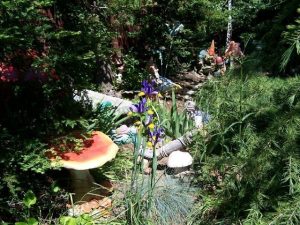If you’d like to get a jump on protecting your garden against the inevitable insect invasions of spring, think about using a horticultural oil spray while your plants are still asleep. Using horticultural oils on fruit trees during their dormant season to control overwintering insects has been a common integrated pest management practice for years. But these sprays are also effective in the ornamental garden both before and during the growing season. If applied at the right time and in the right way (always read the label), the sprays can be one important tool in controlling many common soft-bodied garden pests such as mites, aphids, white flies and mealy bugs that might overwinter on your plants. In addition, they can help control some diseases, such as powdery and downy mildew, leaf spot, rust and fungi.
Historically, horticultural oils were called “dormant” oils because they were sprayed only in winter before the trees/plants formed buds in spring. They tended to be “heavier” oils, with sulfur added. Over time, as refining processes were improved, lighter, sulfur-free sprays were developed that could be used in any season because they were less likely to damage plants in leaf or flower. So today, the term “dormant” no longer refers to the type of oil per se, but rather, the season of application.
Horticultural sprays are either plant based or highly refined petroleum products. The sprays work by suffocating the insects and exposed eggs that are on the plant at the time you spray. (One plant-based spray, “neem oil,” works differently in that it is a natural botanical insecticide made from the seeds of the neem tree.) Unlike broad-spectrum pesticides, horticultural oils are much safer because they do not leave a long-term toxic residue that can harm beneficial insects. “Horticultural oils … degrade rapidly through evaporation and have very low toxicity or almost no toxicity to humans or wildlife at the rates used to control pests,” says UC Davis Integrated Pest Management (IPM) Director Mary Louise Flint in Pests of the Garden and Small Farm: A Grower’s Guide to Using Less Pesticide (University of California Press, 1998). One exception is neem oil, which can be mildly toxic to fish and other aquatic life.
Here are a few tips for using dormant sprays:
Use the right oil – IPM guidelines suggest that you choose “supreme or superior-type oils with a minimum unsulfonated residue (UR) of 92 and a minimum percent paraffin (%Cp) of 60%.” Greek to you? Just jot it down, take it to the store, and consider this yet another reminder to read the label of any plant spray you are about to buy. Another benefit of reading the product label is that it will often tell you how often you can apply the spray and will mention any plants that might be harmed by its application.
Never spray when . . . it is within 48 hours before or after freezing temperatures; the tree or plant is water stressed; or it is foggy or rainy. Some dormant sprays are better used before the tree/plant forms buds, so again, be sure to read the label for proper timing. Thoroughly water in-ground plants several days before applying oils, and sooner for potted plants, which tend to dry out more quickly.
Be extra careful with annual crops–Don’t apply a horticultural oil to your vegetable garden unless you carefully read the product label. Much more research has been done on the use of these oils on fruit trees and ornamentals than on the edible garden, so check the label first.
Want more information about horticultural oils or UCCE’s Integrated Pest Management Program? Visit http://ipm.ucanr.edu/PMG/menu.homegarden.html.
Rachel Oppedahl is a University of California Cooperative Extension Master Gardener of Tuolumne County.
UCCE Master Gardeners of Tuolumne and Calaveras Counties can answer home gardening questions. Call 209-533-5912 or go to: http://ucanr.edu/survey/survey.cfm?surveynumber=7269 to fill out our easy-to-use problem questionnaire. Check out our website at: http://cecentralsierra.ucanr.edu/Master_Gardeners/ You can also find us on Facebook.


